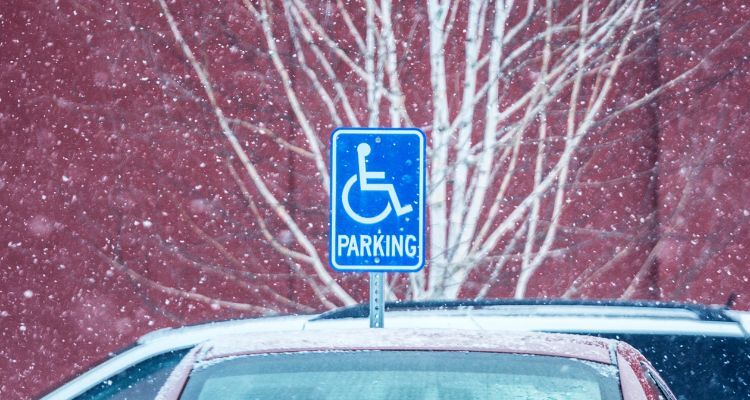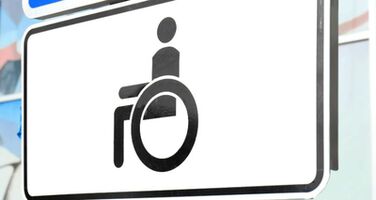
Discover the Benefits of Having a Handicap Placard in Nebraska
Navigating life with a disability can present numerous challenges, but there are tools designed to help make everyday tasks more accessible. One such tool is the disability tag, which allows individuals with qualifying disabilities to park in designated accessible spaces. In NE, a disability tag can be a lifeline for people with mobility issues, granting them easier access to public spaces, services, and businesses by providing parking privileges that enhance convenience and independence.
Having a disability tag in NE offers a range of benefits beyond just parking in designated spots. It can alleviate stress, help you stay closer to critical locations, and even make certain legal accommodations, such as extended parking time limits. In this article, we'll explore the various benefits of having a disability tag in Nebraska, outline how to apply for one, explain the eligibility criteria, and answer frequently asked questions (FAQs). By understanding the full scope of these benefits and how to use your disability tag, you can make the most of the privileges available to you.
What Is a Handicap Placard in Nebraska?
Definition and Purpose
A disability tag (also called a placard) is a parking permit issued to individuals who have a qualifying disability that affects their mobility or ability to walk. In NE, the disability tag allows individuals to park in designated accessible parking spaces, which are marked with the international symbol of accessibility. These spaces are often located near the entrances to buildings, making it easier for individuals with disabilities to access services, stores, medical offices, and other public areas.
The disability tag can be used whether the individual is driving the vehicle or is a passenger. It must be displayed properly while parked, usually by hanging it from the rearview mirror, and removed when the vehicle is in motion.
Types of Disability Tags Available in Nebraska
NE offers several types of handicap permits to meet the needs of individuals with temporary or permanent disabilities:
Permanent Disability Tag: This is issued to individuals with long-term or permanent disabilities that are unlikely to improve. The permanent disability tag is valid for up to six years and must be renewed before it expires.
Temporary Disability Tag: For individuals with temporary disabilities, such as those recovering from surgery or a short-term injury. Temporary disability tags are valid for up to six months, and they can be renewed if necessary.
Disability License Plates: These are available for individuals with permanent disabilities who own or lease their vehicles. The plates provide the same parking privileges as tags but are permanently affixed to the vehicle.
Eligibility Criteria for a Handicap Placard in Nebraska
Medical Conditions That Qualify
In NE, individuals qualify for a disability tag if they have a medical condition that severely limits their ability to walk or requires the use of mobility aids. Common qualifying conditions include:
- Inability to walk 200 feet without stopping to rest.
- Severe respiratory conditions, such as chronic obstructive pulmonary disease (COPD), that limit lung capacity.
- Use of portable oxygen.
- Cardiac conditions classified as Class III or IV by the American Heart Association, indicating severe functional limitations.
- Severe neurological, orthopedic, or arthritic conditions that limit mobility.
- Dependence on mobility aids such as a wheelchair, walker, cane, or crutches.
Who Can Certify Eligibility?
To apply for a disability tag in NE, a healthcare provider must certify that the individual has a qualifying disability. Eligible healthcare providers include:
- Licensed physicians
- Physician assistants (PAs)
- Advanced practice registered nurses (APRNs)
- Chiropractors (for certain conditions)
- Podiatrists (for lower limb impairments)
The healthcare provider will fill out the necessary section of the disability tag application, confirming that the applicant meets the medical criteria for a disability tag.
How to Apply for a Handicap Placard in Nebraska
Step-by-Step Application Process
Here’s a step-by-step guide to applying for a Nebraska handicap placard:
Obtain the Application: You can download the Application for Handicapped Parking Permit (Form DMV 01-08) from the Nebraska Department of Motor Vehicles (DMV) website or pick up a copy from a local DMV office.
Complete the Personal Information Section: Provide your name, address, driver’s license or state ID number, and other personal details.
Get Medical Certification: Have a licensed HandicapMD healthcare provider complete the section of the application that certifies your disability. This certification is required for both temporary and permanent disability tags.
Submit the Application: Submit your completed application in person or by mail to the state's DMV or your local county treasurer’s office. Some offices may also accept electronic submissions.
Receive Your Disability Tag: Once your application is processed, you will receive your disability tag or license plates in the mail, usually within two to four weeks.
Temporary vs. Permanent Tags
- Temporary disability tags are issued for short-term mobility impairments and are valid for up to six months. If your condition persists beyond this period, you may apply for a renewal.
- Permanent disability tags are valid for up to six years. They must be renewed before they expire, and individuals with permanent disabilities are not required to submit new medical certification when renewing.
Fees for Disability Tags
In NE, there is no fee for applying for or renewing a disability tag, whether it is temporary or permanent. However, if you are applying for disability license plates, standard vehicle registration fees may apply.
Key Benefits of Having a Handicap Placard in Nebraska
1. Access to Designated Accessible Parking Spaces
The most immediate and noticeable benefit of having a disability tag is the ability to park in designated handicap parking spaces. These spaces are generally located closer to building entrances, allowing individuals with mobility challenges to reduce the distance they need to travel. These spots are typically wider than standard spaces, making it easier for individuals using mobility devices like wheelchairs, walkers, or scooters to enter and exit their vehicle.
The convenience of parking close to the entrance is not only a practical advantage but also a safety consideration. During inclement weather, uneven surfaces, or when navigating busy parking lots, having a shorter distance to travel can make a significant difference.
2. Enhanced Independence and Freedom
One of the most important benefits of a handicap placard is the increased independence it affords individuals with disabilities. With easy access to parking spaces close to their destination, people can navigate public spaces with less reliance on others for assistance. This independence allows individuals to participate more fully in daily activities like running errands, attending appointments, or enjoying recreational outings.
Whether you’re visiting a grocery store, shopping mall, or public park, having a disability tag enables you to approach these activities with more confidence, knowing that accessible parking is available.
3. Accommodation for Temporary Disabilities
In NE, the disability placard system is not only for individuals with permanent disabilities. People recovering from surgery, injuries, or medical treatments that temporarily affect their mobility can also apply for a temporary disability pass. This temporary accommodation ensures that those experiencing short-term mobility issues can still access essential services without difficulty.
For example, if someone undergoes knee surgery and requires a few months of recovery time, they can apply for a temporary disability pass to use accessible parking spaces during that period. This allows them to continue engaging in everyday activities without being hindered by mobility limitations.
4. Legal Protections and Enforcement
Disability tags in NE come with legal protections that ensure individuals with disabilities are treated fairly and have access to the accommodations they need. The Americans with Disabilities Act (ADA) mandates that public and private entities provide accessible parking spaces for people with disabilities. By using a legally issued disability tag, individuals are granted the right to use these reserved spaces.
In NE, misuse of accessible parking spaces by individuals without a disability tag can result in fines and other penalties. The state takes the protection of accessible parking spaces seriously, ensuring that these spots are available only to those who genuinely need them.
5. Convenience at Medical and Government Facilities
Many medical and government facilities provide a significant number of accessible parking spaces, recognizing that individuals visiting these locations may have mobility issues. Whether you are going to a hospital, clinic, DMV office, or municipal building, having a disability tag ensures you will have access to parking spaces that meet your needs.
These reserved parking spots are usually located near the entrance to these facilities, which is particularly helpful when visiting for medical appointments or other essential services. It ensures that individuals with disabilities can enter and exit these facilities with greater ease and comfort.
6. Improved Safety for Individuals with Mobility Challenges
Parking far from a building’s entrance can pose safety risks for individuals with mobility issues, especially when crossing large parking lots or busy streets. Accessible parking spaces mitigate these risks by providing a safe and close location for individuals to park. Additionally, the extra space around these parking spots allows individuals to exit their vehicles safely without the risk of being blocked by other parked cars.
For individuals using mobility aids, such as walkers or wheelchairs, accessible parking spaces are a critical safety feature. Without adequate space to navigate around the vehicle, it can be challenging to enter and exit safely.
7. Support for Caregivers and Companions
A disability tag doesn’t only benefit the individual with the disability but also provides convenience and support for caregivers and companions. Caregivers who are driving or assisting someone with limited mobility can use the tag to park closer to entrances, making the process of helping someone in and out of the vehicle much easier.
This is particularly helpful for caregivers who may be managing multiple tasks or appointments, as it allows them to focus on providing care without worrying about the distance between the parking space and the building.
8. Accessible Parking at Public Events and Tourist Locations
NE is home to a wide range of public events, festivals, and tourist attractions, and disability tags provide essential access to these locations. Whether you’re attending a concert, sporting event, or visiting a state park, a disability tag ensures you can park in accessible spots designed to accommodate individuals with limited mobility.
Many public event venues offer enhanced accessibility features, including reserved parking spaces near entrances, ramps, and wheelchair-friendly pathways. Having a disability tag ensures you can enjoy these events and attractions without worrying about parking difficulties.
9. Reciprocity in Other States
One of the lesser-known benefits of having a disability tag in NE is that it is valid in other states under reciprocity agreements. This means that if you are traveling outside of NE, you can use your disability tag to park in accessible spaces in most other states. This ensures that your mobility accommodations extend beyond state lines, allowing for more convenient and accessible travel.
10. Increased Quality of Life
Ultimately, the benefits of having a disability tag in NE contribute to an improved overall quality of life for individuals with disabilities. By removing barriers to parking and making daily activities more accessible, a disability tag allows individuals to participate more fully in community life, maintain their independence, and manage their mobility challenges more effectively.
The convenience, legal protections, and accommodations that come with a disability tag make it a valuable tool for enhancing the lives of individuals with disabilities in NE.
How to Use Your Disabled Permit Correctly in Nebraska
Proper Display of the Tag
To use your disability tag correctly, it must be clearly visible when the vehicle is parked in a designated accessible space. In NE, the disability tag should be hung from the rearview mirror with the front of the tag facing outward, showing the permit number and expiration date.
It’s important to remove the tag when driving to avoid obstructing your view.
When and Where You Can Park with a Disability Tag
With a NE disabled permit, you can park in any accessible parking spaces marked with the international symbol of accessibility. These spaces are often near the entrance of public and private facilities, such as shopping malls, hospitals, government buildings, and entertainment venues.
In addition to accessible spaces, some NE municipalities allow disability tag holders to park in metered spaces without paying or for extended periods. However, not all cities offer this benefit, so be sure to check the signage and local regulations in the area where you are parking.
Rules for Family Members and Caregivers
Disability tags are issued to individuals, not vehicles. This means that the tag can only be used when the person to whom the tag was issued is present in the vehicle, either as a driver or passenger. Family members or caregivers cannot legally use the tag unless the individual with the disability is with them. Misuse of a disability tag can result in fines and the loss of parking privileges.
Penalties for Misusing a Disabled Permit in Nebraska
Fines and Legal Consequences for Misuse
Misusing a disability tag in NE can result in fines and other legal penalties. Common forms of misuse include:
- Using someone else’s disability tag without the authorized person being present.
- Parking in an accessible space without displaying a valid tag.
- Using an expired or counterfeit tag.
The fines for misusing a disability tag can range from $100 to $500, depending on the severity of the violation. In some cases, vehicles parked illegally in accessible spaces may be towed at the owner’s expense.
How to Report Disability Tag Abuse
If you witness someone misusing a disability tag or parking in an accessible space without proper authorization, you can report the violation to local law enforcement or parking enforcement authorities. Reporting abuse helps ensure that disabled parking spaces remain available for those who genuinely need them.
Frequently Asked Questions (FAQs)
1. Who qualifies for a disability tag in NE?
Individuals qualify for a disability tag in NE if they have a medical condition that significantly limits their mobility, such as the inability to walk 200 feet without stopping to rest, severe lung or heart disease, or reliance on mobility aids. A licensed healthcare provider must certify that the applicant meets the eligibility criteria.
2. How long does it take to receive a disability tag after applying?
Once you submit your completed application to the Nebraska DMV, it typically takes two to four weeks to process and mail your disability tag.
3. Can I use my disability tag in another state?
Yes. Under the Americans with Disabilities Act (ADA), NE disability tags are recognized in all other U.S. states, so you can use your tag to park in designated accessible spaces across the country.
4. How do I renew my disability tag in NE?
To renew a permanent disability tag, you can complete a renewal application through the state's DMV. Renewals do not require new medical certification. For temporary disability tags, you will need to submit a new application with updated medical certification from your healthcare provider.
5. What should I do if my disability tag is lost or stolen?
If your disability tag is lost or stolen, you should contact the state's DMV to request a replacement. You may need to provide proof of identity and complete a new application. Replacements are usually free of charge for tags.
6. Can a family member use my disability tag without me?
No. A disability tag can only be used when the individual to whom it was issued is present in the vehicle. Family members or caregivers are not allowed to use the tag unless you are with them.
Conclusion
Having a handicap placard in Nebraska offers numerous benefits that can greatly improve the quality of life for individuals with mobility impairments. From easy access to designated accessible parking spaces to extended parking privileges in some areas, a disability tag can make day-to-day activities more manageable and less stressful.
Understanding the application process, eligibility criteria, and proper usage is crucial to making the most of your disability tag. By following the rules and using the tag responsibly, you can enjoy the full range of benefits while avoiding penalties. Whether you're applying for a disability tag for the first time or renewing an existing one, the freedom and convenience it provides can help you maintain your independence and navigate public spaces with greater ease.
.png)






